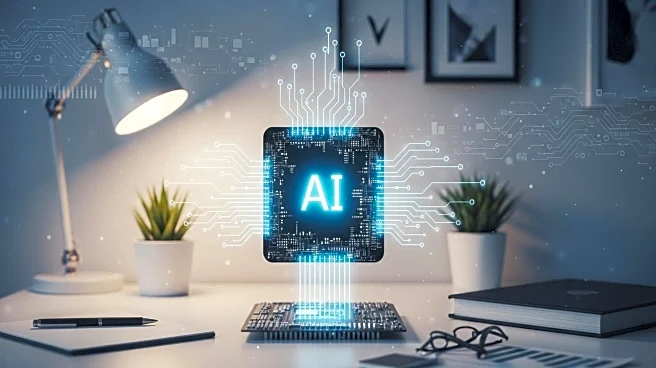What's Happening?
Industry experts are advising against the appointment of Chief AI Officers, suggesting that AI should be integrated across all teams rather than siloed into a single department. The argument is that AI, much like the internet in the late 1980s and early 1990s, is a pervasive technological wave that should be embedded within every aspect of business operations. The recommendation is to appoint a Chief Strategy Officer who can focus on incorporating AI into business strategies, allowing for a more holistic approach to technological integration. This perspective highlights the importance of AI as a tool for efficiency and growth, rather than a standalone entity requiring its own leadership role.
Why It's Important?
The integration of AI across all teams rather than isolating it within a specific department is crucial for maximizing its potential benefits. By embedding AI into the strategic objectives of every team, businesses can enhance efficiency and effectiveness, driving growth and innovation. This approach prevents the siloing of AI initiatives, which can limit their impact and acceptance within the organization. The call for a Chief Strategy Officer to oversee AI integration reflects a broader trend towards strategic adaptability, ensuring that businesses remain agile and responsive to technological advancements. This shift could lead to more cohesive and dynamic business models, benefiting industries that rely heavily on technological innovation.
What's Next?
Companies may begin reevaluating their leadership structures to better integrate AI into their strategic planning. This could involve redefining roles and responsibilities within the C-suite to ensure that AI is not just a technological add-on but a core component of business strategy. As businesses adapt to this approach, there may be increased focus on training and development to equip teams with the skills necessary to leverage AI effectively. Additionally, organizations might explore new metrics for measuring the impact of AI on business outcomes, fostering a culture of continuous improvement and innovation.
Beyond the Headlines
The move away from appointing Chief AI Officers could have broader implications for corporate culture and leadership dynamics. It challenges traditional notions of hierarchical leadership and promotes a more collaborative and integrated approach to technology adoption. This shift may also influence how companies approach other emerging technologies, encouraging a mindset of strategic integration rather than isolated implementation. Furthermore, it raises questions about the future of specialized roles in the tech industry and how businesses can best prepare for ongoing technological evolution.









